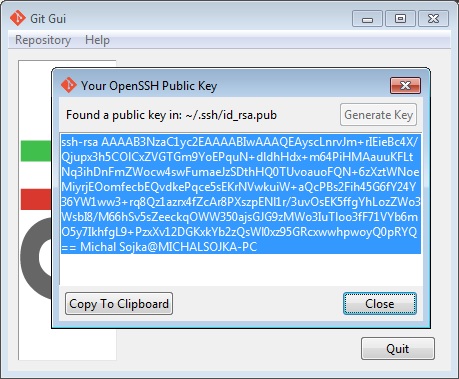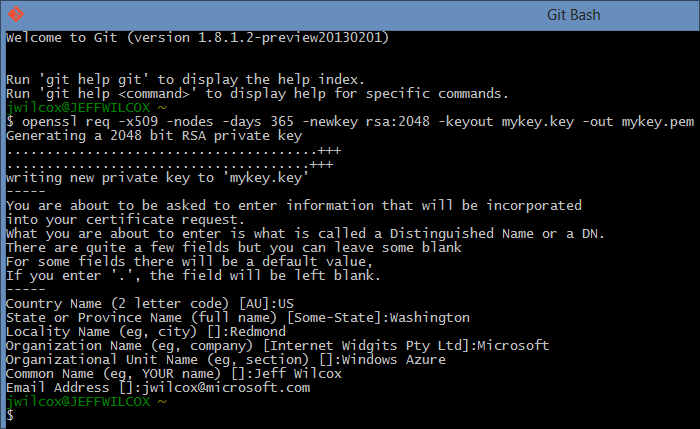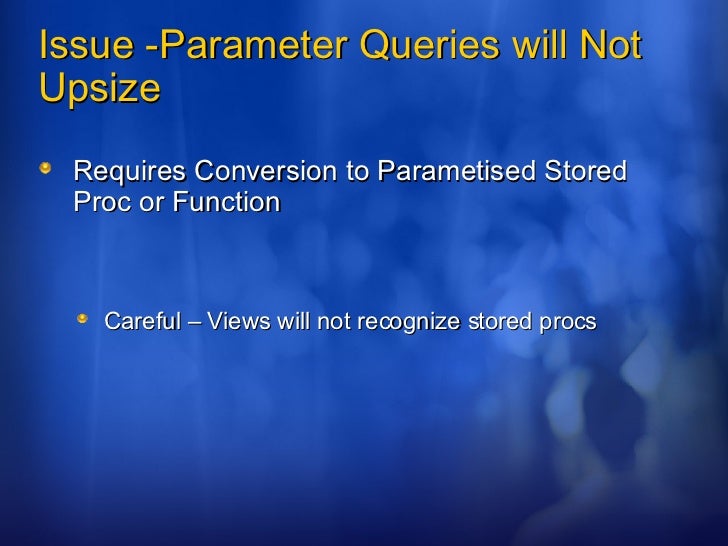Generate Ssh Key Git Linux
With a secure shell (SSH) key pair, you can create virtual machines (VMs) in Azure that use SSH keys for authentication, eliminating the need for passwords to sign in. This article shows you how to quickly generate and use an SSH public-private key file pair for Linux VMs. You can complete these steps with the Azure Cloud Shell, a macOS or Linux host, the Windows Subsystem for Linux, and other tools that support OpenSSH.
Note
VMs created using SSH keys are by default configured with passwords disabled, which greatly increases the difficulty of brute-force guessing attacks.
- SSH keys are created using a key generation tool. The SSH command line tool suite includes a keygen tool. Most git hosting providers offer guides on how to create an SSH Key. Generate an SSH Key on Mac and Linux. Both OsX and Linux operating systems have comprehensive modern terminal applications that ship with the SSH suite installed. The process for creating an SSH key is the same between them.
- Jun 22, 2012 You can generate the SSH Key in a convenient location, such as the computer, and then upload the public key to the SSH key section. Then, when you create a new Droplet, you can choose to include that public key on the server. No root password will be emailed to you and you can log in to your new server from your chosen client.
- Use the ssh-keygen command to generate SSH public and private key files. By default, these files are created in the /.ssh directory. You can specify a different location, and an optional password (passphrase) to access the private key file. If an SSH key pair with the same name exists in the given location, those files are overwritten.
How to Generate SSH key for Git. SSH keys are an access credential used in SSH protocol (Secure Shell) which is a network protocol that helps to login from one computer to another securely, as well as to manage networks, operating systems, and configurations. Install it with sudo apt-get install git (see here) Configure Git (see here) Implement SSH on GitHub/BitBucket. Generate the SSH key with ssh-keygen -t rsa -b 4096 (see here) Copy the content of your public SSH key, it is the file idrsa.pub by default; Paste the content into your GitHub/BitBucket account on the SSH key section; Get.
For more background and examples, see Detailed steps to create SSH key pairs.
For additional ways to generate and use SSH keys on a Windows computer, see How to use SSH keys with Windows on Azure.
Supported SSH key formats
Azure currently supports SSH protocol 2 (SSH-2) RSA public-private key pairs with a minimum length of 2048 bits. Other key formats such as ED25519 and ECDSA are not supported.
Create an SSH key pair
Use the ssh-keygen command to generate SSH public and private key files. By default, these files are created in the ~/.ssh directory. You can specify a different location, and an optional password (passphrase) to access the private key file. If an SSH key pair with the same name exists in the given location, those files are overwritten.
The following command creates an SSH key pair using RSA encryption and a bit length of 4096:

If you use the Azure CLI to create your VM with the az vm create command, you can optionally generate SSH public and private key files using the --generate-ssh-keys option. The key files are stored in the ~/.ssh directory unless specified otherwise with the --ssh-dest-key-path option. The --generate-ssh-keys option will not overwrite existing key files, instead returning an error. In the following command, replace VMname and RGname with your own values:
Provide an SSH public key when deploying a VM
To create a Linux VM that uses SSH keys for authentication, specify your SSH public key when creating the VM using the Azure portal, Azure CLI, Azure Resource Manager templates, or other methods:
 Enter the model, country and IMEI and the program will search for the unlock code in the Internet and will show it on screen. You'll see a long list of unlockable models, including Nokia, Samsung, Siemens, Maxon, NEC, Sony, Panasonic, Vitel, AEG / Telital or Alcatel, although we'll also miss some models.You'll need Internet connection to use the program. Would you like to unlock your mobile phone to use it with any SIM card?Apparently, there are only two ways to unlock it: Phoning the company after having been with them more than one year or paying any enterprise to unlock it.Now, thanks to NokiaFREE Unlock Codes Calculator you'll be able to unlock your mobile phone and use it with any SIM card.
Enter the model, country and IMEI and the program will search for the unlock code in the Internet and will show it on screen. You'll see a long list of unlockable models, including Nokia, Samsung, Siemens, Maxon, NEC, Sony, Panasonic, Vitel, AEG / Telital or Alcatel, although we'll also miss some models.You'll need Internet connection to use the program. Would you like to unlock your mobile phone to use it with any SIM card?Apparently, there are only two ways to unlock it: Phoning the company after having been with them more than one year or paying any enterprise to unlock it.Now, thanks to NokiaFREE Unlock Codes Calculator you'll be able to unlock your mobile phone and use it with any SIM card.
If you're not familiar with the format of an SSH public key, you can display your public key with the following cat command, replacing ~/.ssh/id_rsa.pub with the path and filename of your own public key file if needed:
A typical public key value looks like this example:
If you copy and paste the contents of the public key file to use in the Azure portal or a Resource Manager template, make sure you don't copy any trailing whitespace. To copy a public key in macOS, you can pipe the public key file to pbcopy. Similarly in Linux, you can pipe the public key file to programs such as xclip.
The public key that you place on your Linux VM in Azure is by default stored in ~/.ssh/id_rsa.pub, unless you specified a different location when you created the key pair. To use the Azure CLI 2.0 to create your VM with an existing public key, specify the value and optionally the location of this public key using the az vm create command with the --ssh-key-values option. In the following command, replace VMname, RGname, and keyFile with your own values:

If you want to use multiple SSH keys with your VM, you can enter them in a space-separated list, like this --ssh-key-values sshkey-desktop.pub sshkey-laptop.pub.
SSH into your VM
With the public key deployed on your Azure VM, and the private key on your local system, SSH into your VM using the IP address or DNS name of your VM. In the following command, replace azureuser and myvm.westus.cloudapp.azure.com with the administrator user name and the fully qualified domain name (or IP address):
If you specified a passphrase when you created your key pair, enter that passphrase when prompted during the login process. The VM is added to your ~/.ssh/known_hosts file, and you won't be asked to connect again until either the public key on your Azure VM changes or the server name is removed from ~/.ssh/known_hosts.
If the VM is using the just-in-time access policy, you need to request access before you can connect to the VM. For more information about the just-in-time policy, see Manage virtual machine access using the just in time policy.
Next steps
For more information on working with SSH key pairs, see Detailed steps to create and manage SSH key pairs.
If you have difficulties with SSH connections to Azure VMs, see Troubleshoot SSH connections to an Azure Linux VM.
SSH keys are an access credential used in SSH protocol (Secure Shell) which is a network protocol that helps to login from one computer to another securely, as well as to manage networks, operating systems, and configurations. This snippet is going to help you add an SSH key to the ssh-agent, generate a new SSH key, learn how to find the SSH key of your PC and how to connect it with your GitHub/bitbucket account. You can also find information on the use of SSH keys.
Now let's find out how we can checkout PC's SSH keys.
Checking PC's SSH Keys
Type ls -al ~/.ssh so as to see your ssh keys:
By default, the filenames of the public keys are one of the following:
Generate a new SSH key
Type this below, using your GitHub's account email:
Apr 20, 2006 The primary key is a property of the data, not the table that holds the data. Unfortunately, the minimal candidate key is sometimes not a good primary key in the real world. For example, if the primary key is 6 columns wide and I need to refer to a row from another table, it’s impractical to make a 6-column wide foreign key. 
The following text will show up after which you can hit the “Enter” button:
In this section, you can hit “Enter” again or type the secure passphrase (more about passphrase).
Adding an SSH key to the ssh-agent
Now let’s find out how we can add the SSH key to ssh-agent. Before adding, check your ssh keys or generate a new key.
- Be sure ssh-agent is enabled:
- Add your SSH key to the ssh-agent. If you used an existing SSH key rather than generating a new SSH key, you would need to replace id_rsa in the command with the name of your existing private key file:
How To Add SSH Key To Github Account
- Log into your Github's account. In the top right corner of any page, click your profile photo, then click Settings.
- In the user settings sidebar, go to SSH and GPG keys.
- Click New SSH key.
- Type Title and your SSH Key.
You can get your ssh key by typing below.
Now you have added your PC's SSH key to your Github's account.
Back up old SSH keys
If there are existing SSH keys, but you do not want to use them for connecting to Bitbucket Server, you should back up these old keys running the following:
Generate Ssh Key Git Linux Download
Why we need SSH key (for Linux and OSX)
If you use Git and want to clone anything from remote repositories, you have to choose one of these two ways: HTTPS or SSH. If you use HTTPS, you have to type your account access every time you communicate with the remote repository, or change your configs and fill your account data (access). Another modern way is to use the SSH authentication method. It is used in many Version Control Systems to have command line access into your servers, etc. SSH key pairs can be used for authentication instead of passwords. Each key pair consists of a private key and a corresponding public key. When you use SSH key for Git, you inform Git that this PC is authenticated for that Github account, and it will never ask you about any access again because you have already given it your SSH key.